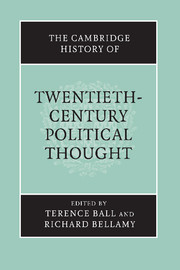Book contents
- Frontmatter
- Editors’ introduction
- Part I The changing fortunes of liberal democracy
- 1 The coming of the welfare state
- 2 Politics and markets: Keynes and his critics
- 3 The advent of the masses and the making of the modern theory of democracy
- 4 Nationalism and imperialism
- 5 Fascism and racism
- 6 Conservatism
- 7 Christian democracy
- 8 Critics of totalitarianism
- 9 The end of the welfare state?
- Part II Varieties of Marxism
- Part III Science, modernism and politics
- Part IV New social movements and the politics of difference
- Part V Beyond Western political thought
- Biographies
- Bibliography
- Subject index
- Name index
- References
4 - Nationalism and imperialism
from Part I - The changing fortunes of liberal democracy
Published online by Cambridge University Press: 28 March 2008
- Frontmatter
- Editors’ introduction
- Part I The changing fortunes of liberal democracy
- 1 The coming of the welfare state
- 2 Politics and markets: Keynes and his critics
- 3 The advent of the masses and the making of the modern theory of democracy
- 4 Nationalism and imperialism
- 5 Fascism and racism
- 6 Conservatism
- 7 Christian democracy
- 8 Critics of totalitarianism
- 9 The end of the welfare state?
- Part II Varieties of Marxism
- Part III Science, modernism and politics
- Part IV New social movements and the politics of difference
- Part V Beyond Western political thought
- Biographies
- Bibliography
- Subject index
- Name index
- References
Summary
The twentieth century witnessed the birth of the first global order the world has known. Few would dispute that the forces of imperialism and nationalism have played a major part in bringing this world into existence. The role played by political ideas about these concepts is more contentious, if only because there has seldom been agreement about what they mean, let alone their practical importance. It is the purpose of this chapter to suggest some of the ways in which ideas and events have interacted in the making and breaking of modern empires and nation states.
In outline, the story is quickly told. At the end of the nineteenth century the world was dominated by a few major powers, whose governments were engaged in territorial, economic and ideological expansion. In the United States and Russia, expansion involved consolidating their control of the North American and Eurasian continents respectively, without significant opposition, at least until the Russians were stopped in their tracks by Japan in 1904. Elsewhere, imperial competition brought the great powers to the verge of war, although in the end they drew back from the brink, most famously in the case of Africa, where the continent was divided at the 1884 Congress of Berlin, in the interests of preserving the balance of power and European peace. This phase of international history ended with the First World War. For the previous century, however, European energies were engaged in every corner of the globe, with little regard for the interests or cultural sensitivities of the local inhabitants.
- Type
- Chapter
- Information
- The Cambridge History of Twentieth-Century Political Thought , pp. 104 - 122Publisher: Cambridge University PressPrint publication year: 2003

